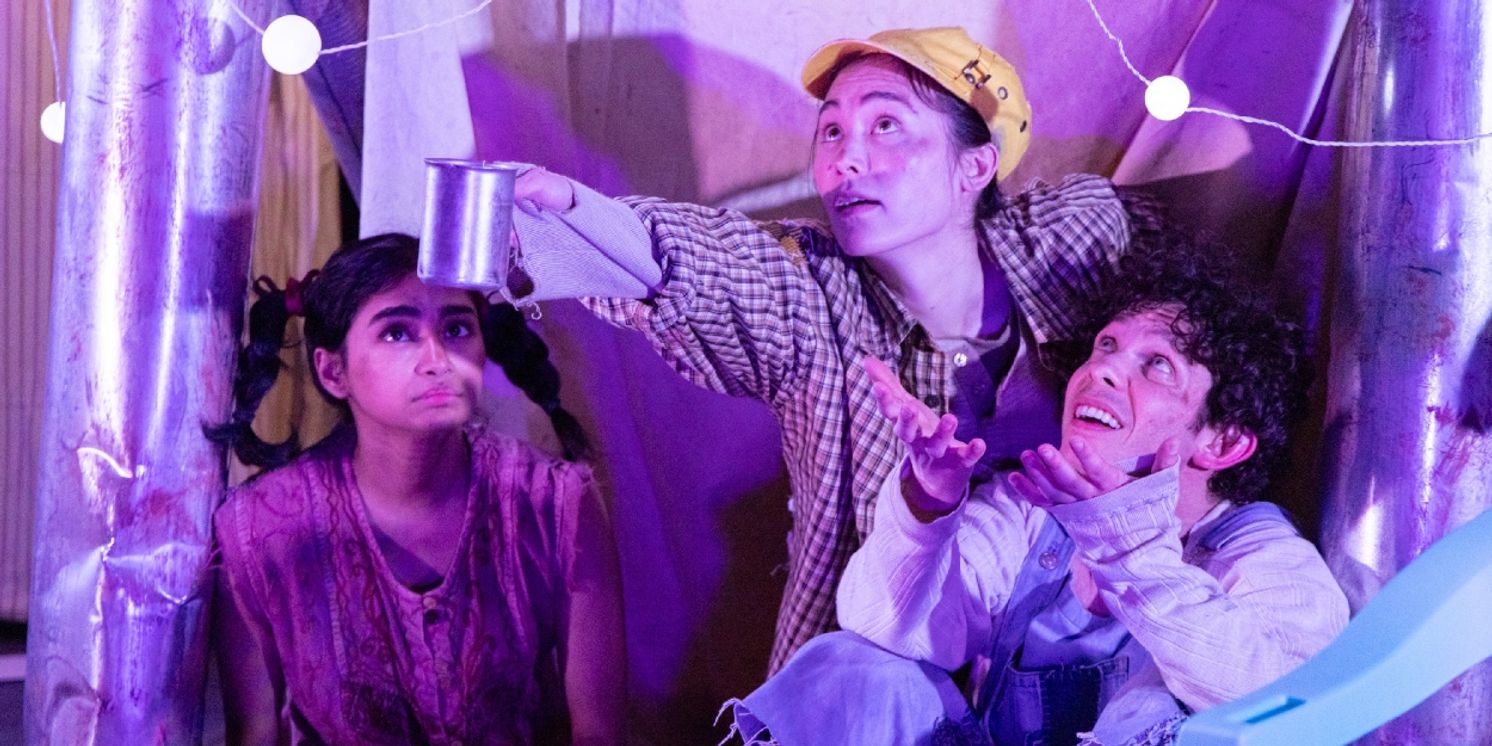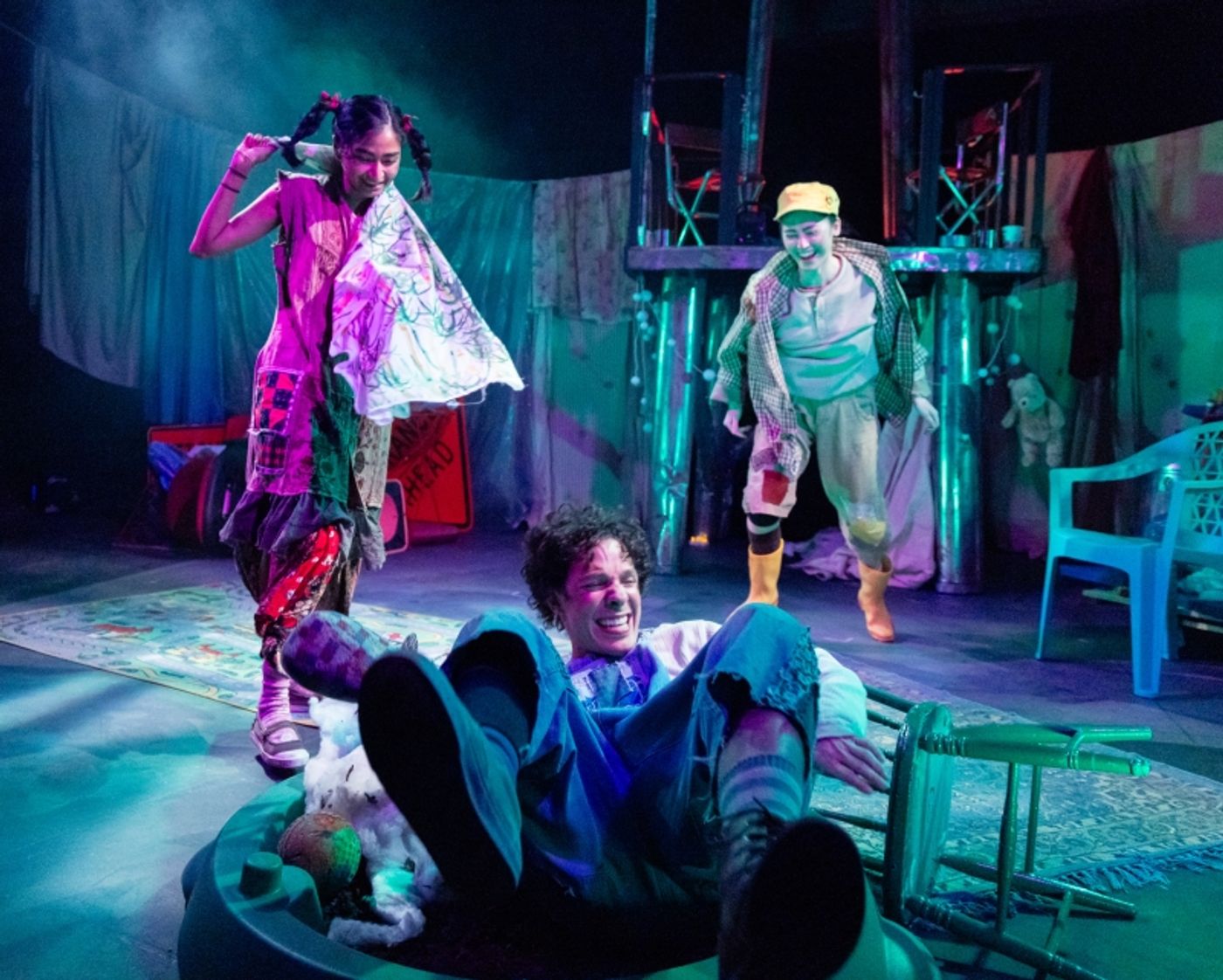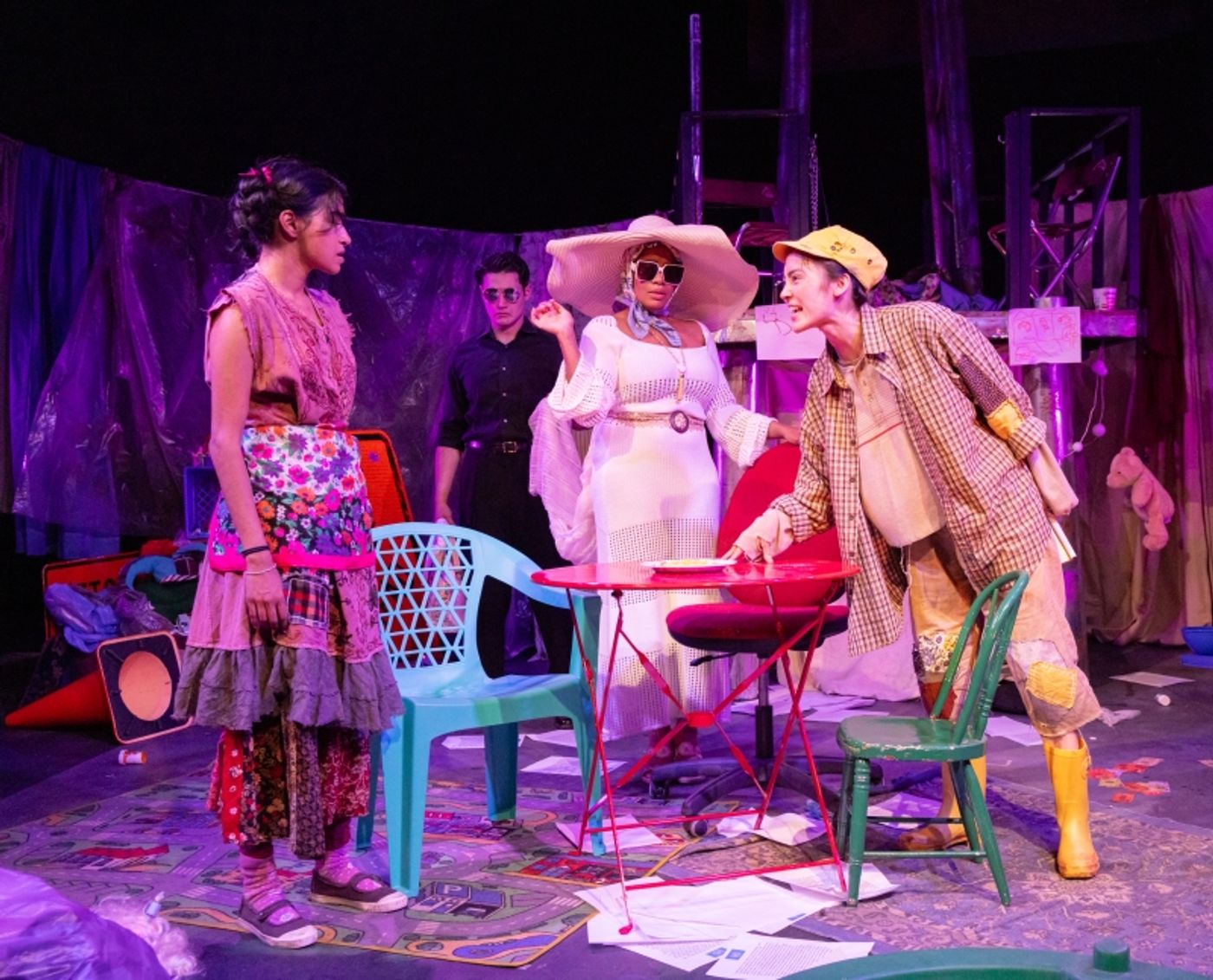Review: FRONTIERS SANS FRONTIERS at Spooky Action Theater
Running through May 19th

From April 25th to May 19th, under a few trashbags and discarded cups of tea, DC theatre goers may be able to find Spooky Action Theater's production of Frontiers Sans Frontiers.
The show is centered around three children, Win (Anna Takayo), Noon (Surasree Das), and Pan (Victor Salinas) who live together in an unnamed conflict-torn nation in a hovel full of trash and refuse. They get by by begging tourists and foreigners for "money presents," as well as picking their pockets. Win, the eldest, is more or less the "leader," training the others on morose poses to make in order to guilt potential donors, and impressing the others with his strong command of "engaleash." Though destitute, and commonly in danger, the children find happiness, comfort, and family in each other.

But these things can only ever be temporary when your nation is ripe with natural resources. Throughout the first act, the kids are visited by a myriad of outsiders, all representative of some larger organization and pathos. They meet a teacher (Jamil Joseph), perhaps representing the Peace Corps, or Teachers without Borders, who agrees to teach Win English. They are visited by a W.H.O. representative (Lauren Davis), representing endless external international bureaucratic NGOs, as well as a member of the Press (Camillo Linares) who wants the children to take him closer to the armed conflict, representing, well, just that. Further visitors are a B-list actress (also Davis), representing the global neoliberal elite, A "developer" (Frank Britton), representing "entrepreneurs" looking to take advantage of lax labor/ business law, as well as the children themselves, perhaps also representing the prevalence of sexual tourism in countries similar to the fictitious setting. One visitor, a militia member (also Linares) ends the surreal respective visit of a clown (Britton) and a mime (Davis) through murder.
This first act is a thrilling commentary on the state of numerous countries throughout the world, and the adolescents who inhabit them. These children, desperate for comfort and money, are playthings, the means to an end, physical resources in the eyes of these visitors. With each visit, neocolonialism, in its many forms, further deepens its grip on the country, and the children themselves. All this conflict, armed and unarmed, was assumedly brought on by the presence of a precious natural resource: gas.
The show features heavy flatulence, a fun audio-design (Navi) quirk, adding to the comic and bouncy nature of the show. At least that is one's thought initially. As the show progresses it becomes clear this internal gas exists parallel to the one being extracted from below. These children are, in a way, the precious resource itself, victims of its withdrawal.
The conflict and tension caused by these foreign actors and violence echo inside the children, causing fights, anger, and further emotional damage. Being forced to cater to these strange and insidious people has made them afraid, and hungry. The children grapple with intense ideas. Does one stay as they are? Or turn to make yourself in the image of the shiny foreign life? After a raw and draining confrontation, Win and Noon decide to (in their juvenile way) live separately. While trying to ignore Noon, Win and Pan miss the Developer kidnap her, and then become panicked at her absence.
The second act evolves into something more abstract. Win and Pan enter the ubiquitous city in hopes of finding Noon. They are met with pedophiliac bureaucrats, fear, and unfamiliar, clean streets. A moving moment comes when Pan, trying to bring comfort to them both begs the audience for trash, garbage being a comfort to them, a true constant in their life, something they can make a home of. But even this is ripped away.
Eventually, they are graced with the Nobel Laureate (Das), the personification of a neoliberal, individualist utopia hellscape, blessing the foreign actors with her presence, and of course, her gas.
The language here changes. Before the Nobel Laureate, the adults spoke typical English, while the children spoke their altered, fragmented version. Language is a massive part of the show, and the work from the playwright and actors allows it to do a lot of work. This dialect (dialect coach Yetunde Felix-Ukwu) the children speak, a nondescript "broken" English of sorts is small. It is a handful of words combined in infinite ways, that sounds counterintuitive and at times humorous to fluent speakers. However, this does not stop the children from fully communicating their thoughts. They occasionally get confused, but when speaking with each other, they are more than capable of organizing and expressing themselves. This is English picked up from those around them, from suggestive overly produced songs from Baby Boo (Linares) and radio shows. And it's not invalid. It's a tool they must use. However, this new Nobel Laureate, is some iteration, evolution, or potential possession of Noon, and it speaks in long, dynamic sentences, romancing its followers with sumptuous adjectives and complex sentence structure.
At one point in the show, Win asks in his own words, what did they speak before English? Further driving the point that even language and education can be an oppressive tool. The teacher, once thought benevolent for helping the children, is perhaps just a cog in the perpetuation of infinite cycles. This point is hammered again, after the children leave the strange, alluring, and dangerous Nobel Laureate, they are left with just themselves. Until Pan agrees to go with the Teacher, to surrender himself to these dangerous outside people and ideas, fully knowing it will hurt him, but perhaps the only way out before armed conflict reaches them. Win refuses to go. In the final moments of the show, he stands atop the platform, armed with a small hand scythe, yelling "I Win! I win!" A declaration of embracing one's identity, free from influence of the malevolent outside. It could also be interpreted that in denying these outside forces he "wins" by being uncompromised, even in death.
There is an instinct to call this show dark, due to the subject matter it deals with, however, this word is not accurate. Things are more dreadful, more real; though fictitious, there is deep representative and emotional truth. These children exist, their lives and circumstances exist, right now, and we are watching them transpire on stage.

The piece is "super strong." Robust direction from Elizabeth Dinkova and the powerhouse script from Phillip Howze really allows the actors to do moving, honest work. The intense and serious subject matter is just as essential as the many moments of brightness and humor. The earnest and very real feeling performances from Takayo, Das, and Salinas, allow for more surreal and exaggerated ones from orbiting characters. Of particular note is Davis, whose comedic timing and scale were tuned finely, the parody of the script breathing through her characters.
It's fun to look at too. The set (Nadir Bey), props (Liz Long), and costumes (Johnna Presby) come together to create this strange discarded trashland. It's busy, and bright, and all over the place, somehow evocative of the childhood inclination to make something out of anything. Of course a bed is a sandbox filled with mulch, and a belt is a charging cable. A design choice of note is the use and implementation of shadow work in the show. It provides a dynamic almost screen to show the far off world, or a way to show explicit things (violence/nudity) without showing them). If one were to over scrutinize any design decision, the use of lit herbal cigarettes might come into the question. The show provides the grounds for audiences to very easily suspend their disbelief, so an actual burning, smoking cigarette seems uncessary, especially due to the odor and smoke it put off during the show.
Frontiers Sans Frontiers is good. It's refreshing, biting, funny, and relevant. Though it looks and sounds rag-tag, the sophisticated commentary is deeply stimulating. It makes you laugh, it makes you think, and hey, it may even make you fart. The show's runtime is two hours, including 15 minute intermission, and is located at 1810 16th Street NW. More information on the show and tickets can be found at Spooky Action Theater's website.
Reader Reviews
Videos
